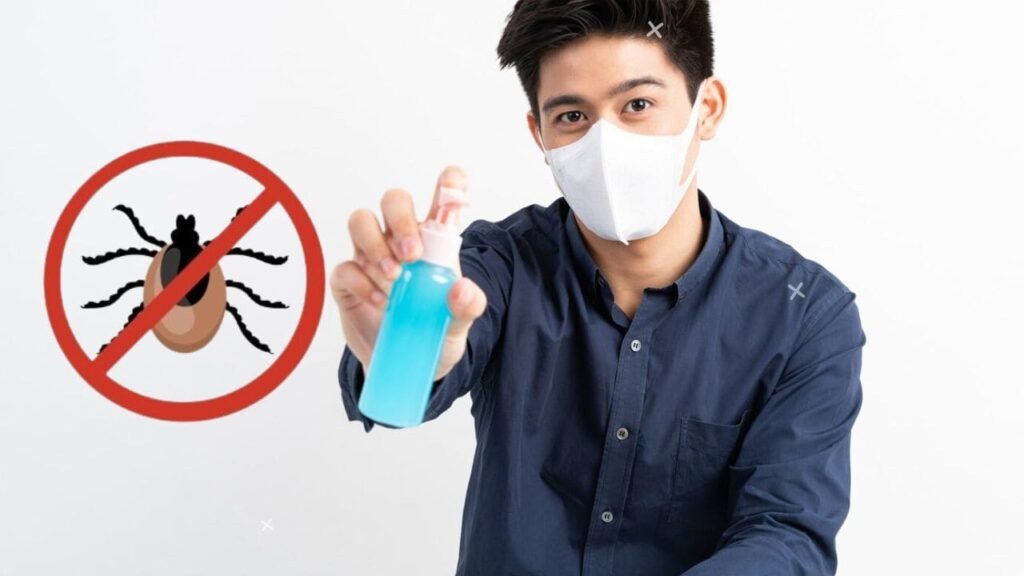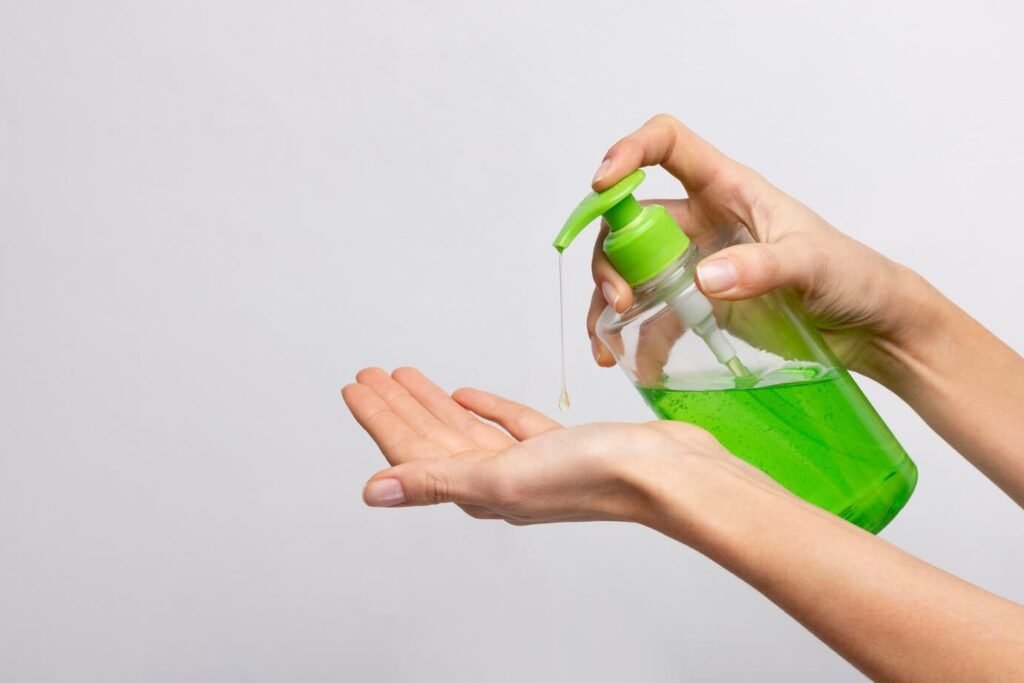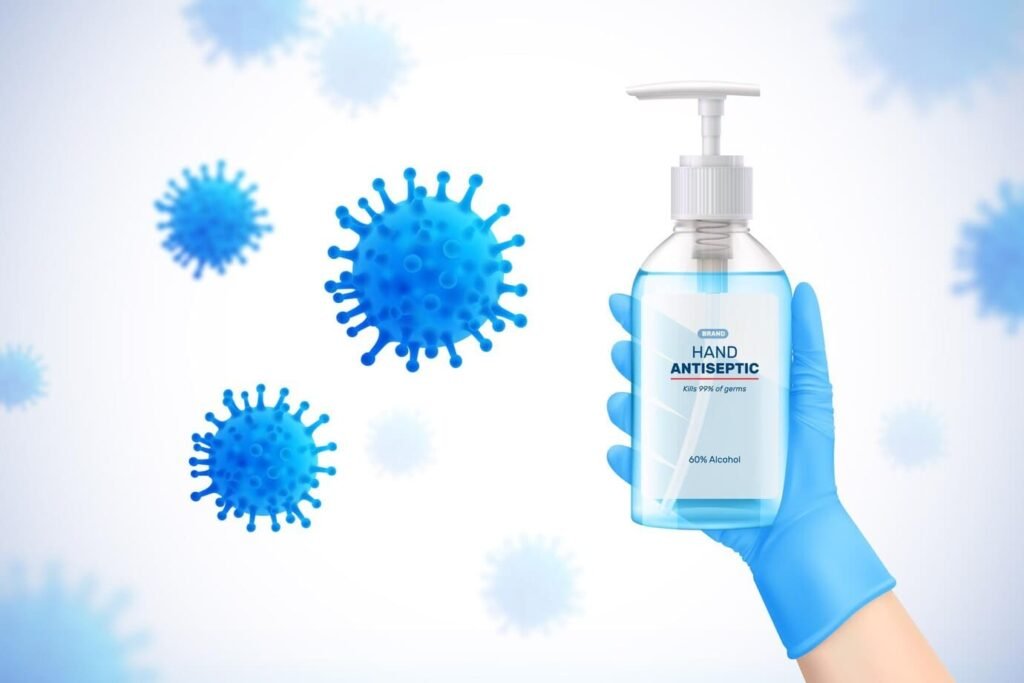


If those small, brownish insects have been crawling over your sheets and feeding on your blood at night, you likely have a bed bug problem on your hands. And you may be wondering – can hand sanitizer kill bed bugs that are infesting your home?
It seems plausible that the alcohol content in hand sanitizer would destroy bed bugs. But is it truly an effective treatment method? This guide has the answers.
After reading this, you’ll know whether hand sanitizer can actually kill bed bugs, the proper usage tips, any safety precautions, and some alternative solutions too. Let’s examine if sanitizer is a DIY option against bed bugs!
Before jumping into treatments, let’s cover the basics of what bed bugs even are.
Bed bugs are tiny parasitic insects that solely feed on blood. An adult bed bug’s oval body resembles an apple seed, reaching 5mm maximum. Newly hatched nymphs are semi-transparent but gain a reddish-brown hue after feeding.
These pests hide out near sleeping areas. At night, they use sharp mouthparts to pierce skin and suck blood. Signs of infestation include red itchy bite marks, blood stains on sheets, a sweet musty smell, and seeing the bugs scuttling away upon entering an area.
Now that really raises some hairs on my neck! Perhaps it’s time to break out some heavy disinfecting solutions…like hand sanitizer.
To understand if hand sanitizer can kill bed bugs, it helps to know what it is and how it functions first.
Hand sanitizer typically contains 60% to 95% alcohol such as:
This high alcohol concentration destroys cells and proteins in bacteria and viruses by penetrating their outer wall, killing them rapidly.
When you apply hand sanitizer and rub your hands together, the alcohol breaks down pathogens’ membranes within 30 seconds, effectively neutralizing these disease-causing microbes.
Logically, dousing bed bugs in alcohol should have the same disinfecting effect, destroying them through cell damage. But more research is still needed on efficacy.

Here’s the big reveal – answering “can hand sanitizer kill bed bugs?”
The verdict is hand sanitizer can kill bed bugs upon direct contact by penetrating and destroying their cell membranes with alcohol. However, there are also major limitations preventing it from resolving full-blown home infestations.
Spotting bed bugs crawling on a surface and dousing them with hand sanitizer allows the alcohol to disrupt their cells and internal structures once absorbed through their protective coating.
If you see bed bugs on fabrics, generously coat the area in sanitizer liquid, give it a few minutes to soak in, then wipe away with a paper towel. The alcohol destroys bugs on contact!
However, while hand sanitizer kills individual bed bugs it contacts, there are downsides preventing complete control of widespread infestations:
You can’t reach hiding spots: Sanitizer only impacts bugs you directly spray or wipe, missing those concealed in crevices.
It doesn’t kill eggs: Resilient eggs and nymphs often survive traditional alcohol applications. They repopulate afterwards.
No lingering effects: Once dried, sanitizer stops working unlike residue-based sprays that keep destroying bugs.
Resistance can develop: Insects can evolve tolerance to certain pesticides over time with repeated exposure.
So while blasting visible bed bugs with sanitizer provides some instant satisfaction, it falls short of comprehensive treatment. Combine hand sanitizer with trapping, steaming, laundering etc. for systemic success.

If adding hand sanitizer to your bed bug removal toolkit, apply my tips below for best results:
Select a hand sanitizer containing at least 70% isopropyl alcohol which penetrates the waxy bed bug shell better than ethyl alcohol. Avoid natural sanitizers with less potent ingredients.
Also steer clear of products with methanol which is toxic when absorbed through skin. Stick to reputable companies like Purell.
Shake the bottle well and liberally coat infested areas like mattress seams, bed frames, baseboards, and upholstery showing signs of bed bugs. Spray bugs and eggs directly when possible and reapply every few days.
After spraying, scrub the area with paper towels, crushing some bugs through friction while helping the alcohol permeate their protective coating. Quickly discard towels with bugs to avoid transfer.
Post-cleaning, encase mattresses and pillows in bed bug proof covers which trap and kills any survivors while blocking new ones from entering.
Sanitizer only impacts what it directly contacts. Hit newly emerged young frequently before they mature and spread. Persistence pays off!
Follow these tips closely to optimize success using hand sanitizer as a supplemental bed bug solution. Consistency and diligence are vital!
Like most pesticides, using hand sanitizer to kill bed bugs demands safety:
Store securely: Keep sanitizer locked up out of reach of kids and pets who may ingest it leading to alcohol poisoning.
Ventilate: Spray sanitizer in rooms with open windows. Avoid inhaling fumes or contact with eyes/mouth.
Exercise caution: Carefully handle treated items to avoid repeated skin contact leading to drying, cracks or burns.
Discard wipes properly: Seal any paper towels with bed bugs remains in plastic bags before immediate outdoor disposal to prevent re-infestation.
With common sense, hand sanitizer can provide a helpful bed bug boost without serious risks!
While convenient, numerous other highly potent bed bug remedies exist:
Vacuuming: Thorough vacuuming along baseboards and furniture removes lodged bugs. Seal and discard vacuum contents immediately after.
Steam cleaning: Hot steam penetrates hidden crevices, instantly killing bugs and eggs it contacts. Steam also has residual impact for hours after.
Essential oil sprays: Certain natural plant oils like clove, neem, and tea tree oil make non-toxic bed bug sprays. Their effects continue destroying bugs for days post-application.
Pesticide dusts: Powdered silica clings to bug bodies, gradually achieving high kill rates. Some stronger powders need professional application. Exercise caution with any chemical pesticide.
Mattress encasements: Bed bug proof covers seal infested mattresses, trapping bugs inside while blocking new ones from getting in for 1-2 years.
Professional chemical treatment: Exterminators use targeted insecticides and growth regulators to comprehensively eliminate infestations in one to three visits.
Compare all methods to build an integrated pest management plan that fights back on multiple fronts simultaneously for highest treatment success rates.
Let’s summarize – is hand sanitizer effective for homeowners battling bed bug infestations? Hand sanitizer alone cannot comprehensively treat full-blown infestations. However, it can quickly kill adults and nymphs on direct contact if applied thoroughly and consistently.
Use hand sanitizer as one supplemental weapon in your pest management arsenal alongside vacuuming, steaming, mattress encasements, and possibly professional chemical treatments for systemic solutions. Stay vigilant in monitoring and combining multiple techniques to successfully eradicate these blood-sucking bugs! United we stand, divided they breed. You’ve got this!
How does hand sanitizer kill bed bugs?
Hand sanitizer kills bed bugs through its alcohol content. Alcohols like isopropyl and ethyl alcohol damage the cell membranes and outer shell of bed bugs upon direct contact, causing dehydration and death.
Is 70% or 91% alcohol hand sanitizer better for bed bugs?
91% alcohol hand sanitizers provide higher potency against bed bugs. However, 70% alcohol formulas can also be effective with thorough and repeated applications. Just ensure the product directly contacts each bug.
Can I use hand sanitizer on mattresses to kill bed bugs?
Yes, you can use hand sanitizer on mattresses, bed frames, box springs and other upholstered areas where you see active bed bugs. Concentrate on seams, folds, crevices and edges where the bugs hide.
How often should you use hand sanitizer to kill bed bugs?
To maximize impact against bed bug infestations, reapply hand sanitizer every 2-3 days for at least 2 weeks. This repeatedly kills newly hatched juvenile bugs before breeding cycles escalate. Be vigilant!
Can I use hand sanitizer on my skin if I have bed bug bites?
No, avoid applying hand sanitizer directly onto skin as this can cause irritation, dryness, cracking or burning. Use an anti-itch hydrocortisone cream specifically formulated for bug bites instead for relief.